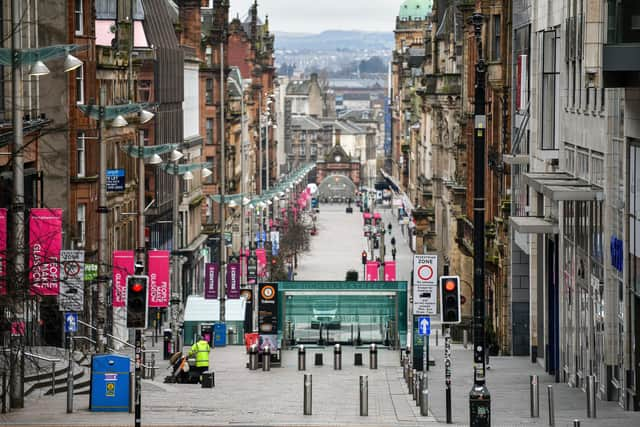Spring Budget 2024: Why 'forgettable' Budget is unlikely to spark high-street revival in Scotland
Earlier this week the Scottish Retail Consortium published retail sales figures for February. The results were sobering. Total retail sales growth during the month fell further to the lowest level in two-and-a-half years. When adjusting for shop price inflation, it was the eighth successive month of declining real terms growth.
That is the prism through which retailers will have looked at the UK Budget – in short, how the Chancellor was going to help shopkeepers keep down costs and what measures would help perk up sluggish high street shopping.
Advertisement
Hide AdAdvertisement
Hide AdThe economic update was mixed. The revised GDP growth figures show the UK should emerge from recession this year, and return to 1.8 per cent next year, still turgid after years of low growth. The news inflation is meant to finally return to around 2 per cent later this year will be welcomed, but still means the very significant costs absorbed by households and businesses in the past 18 months are now baked into the economy.


The tax announcements from the Chancellor are unlikely to set the shopping heather on fire. Mr Hunt made great play of putting the country on a path to lower taxation when referencing the 2p cut to national insurance, albeit he neglected to mention that frozen income tax thresholds mean many households will see, at best, a mixed outcome.
Nonetheless, Scottish households will at least see this tax cut, as previous changes to income tax have not been replicated by the Scottish Government. Freezes in alcohol and fuel duty should help households with their spending, and some middle-income households should benefit from the changes to the Child Benefit Charge thresholds. The Office for Budget Responsibility believes real household disposable income per person should recover to its pre-pandemic peak by 2025/26, so there may be brighter days ahead.
However, there were plenty of measures the Chancellor missed the chance to introduce. He flunked the chance to bring back tax-free shopping for visitors, which would have boosted both tourism and retail. Despite inflation falling back, there were no adjustments to reduce the brutal business rates rise coming in April – which would have generated Barnett consequentials, which could have been passed on to help struggling Scottish shopkeepers. The much-lamented Apprenticeship Levy remains unreformed and little more than a tax on employment.
On the spending front, the UK government continued to make direct commitments to Scotland, with Arbroath, Peterhead, and Kirkwall set to benefit from funding as part of a ‘plan for towns’. While this should generate footfall, a more coherent approach would blunt the business rate, which is rising to a 25-year high. Holyrood will receive £295 million in Barnett consequential revenues – so there is little justification for Scottish ministers to sting grocers with the mooted rates surtax.


It is possible to have sympathy for Mr Hunt. He is caught between the very finite fiscal headroom available to the UK government and the imperative to produce a miraculous revival in the Conservative Party’s political fortunes. That doesn’t take away from the truth that shoppers and retailers will see very little benefit from what is likely to be quite a forgettable Budget.
- Ewan MacDonald-Russell is the deputy head of the Scottish Retail Consortium
Comments
Want to join the conversation? Please or to comment on this article.